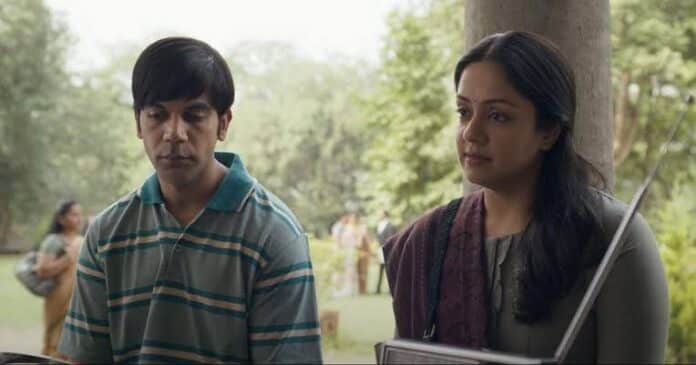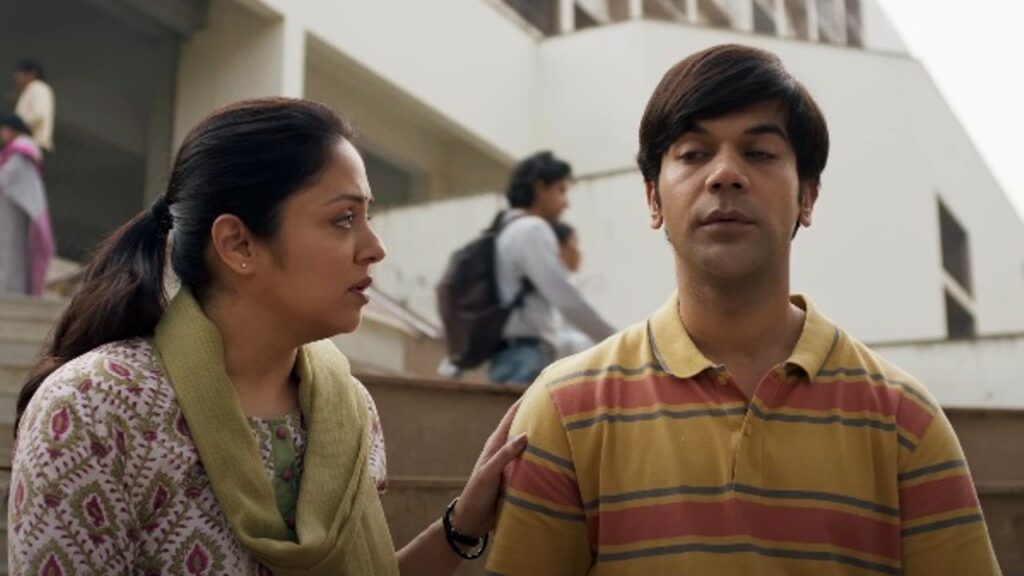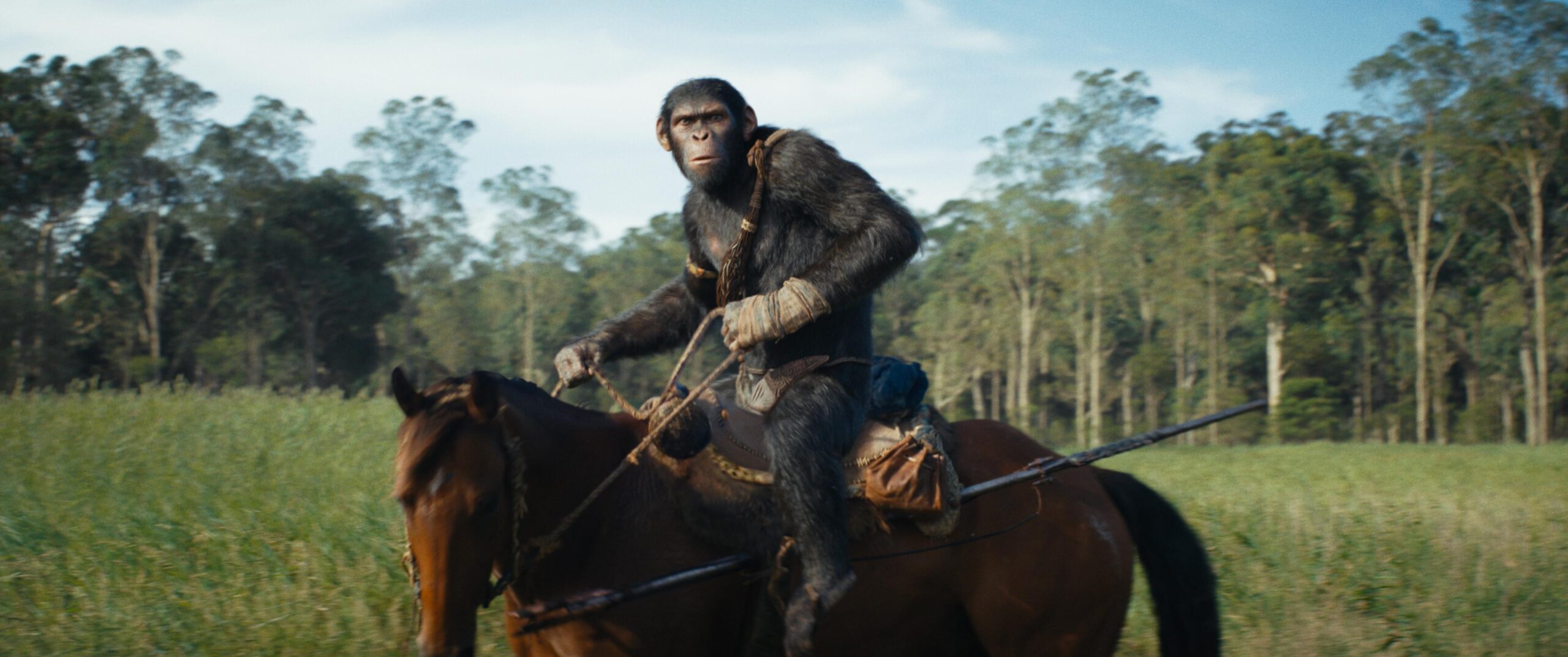Tushar Hiranandani’s sophomore, Srikanth, is loosely based on the life of Srikanth Bolla, the visually impaired industrialist who founded Bollant Industries. The protagonist’s disability failed to affect his professional and personal life. He did not let his limitations become an obstacle to fulfilling his seemingly unattainable aspirations. The inspiring story alters our perspective on individuals with disabilities and compels us not to undermine their ability to achieve their potential when provided with ample support. It depicts the remarkable grit and resilience of a man with enduring confidence as he explores his ideas, his emotional life, and struggles with a society that considers him a feeble being. Such attributes could have made the film impressive if the filmmaker knew how to transcend the pitfalls of a typical biopic by not adhering to a very conventional approach to its material. Though the film has a lightness that most dramas taking us through the lives of real people lack, it takes an observatory view that neither has the undercurrent of a compelling drama nor the finesse of a layered structure. As a result, our viewing experience is bifurcated into two contrasting aspects. On one hand, it becomes an empowering tale that evokes a sense of celebration for the accomplishments of a determined individual. However, on a deeper level, it also leaves us unsatisfied, as there is no directorial signature to be spotted anywhere.
Srikant Bolla was born to the farmer family of Damodar (Srinivas Beesetty) and Venkatamma (Anusha Nuthula) at Machilipatnam, Andhra Pradesh, in July 1992. The birth of a son exhilarates Damodar. But upon realizing that Srikant is congenitally blind, his celebratory state soon shifts from contentment to dissatisfaction. He decides to bury him alive, but Venkatamma forbids his husband from committing the heinous act. As Srikant grows up, he studies in his village school and earns himself a place in the good books of his teachers. But as bullying from his schoolmates increases, his parents are told to admit their son to a special school for the visually impaired in Hyderabad. There, under the tutelage of Devika (Jyothika), Srikant becomes a confident man who can tackle any challenge of his life head-on. After completing his 10th-grade class, Srikant realizes that there is no provision to study science for blind people. So Srikant and Devika file a case against the Indian education system. From then on, Srikant has to fight one battle after another to become the person we all know today.

Srikanth exists in a universe that keeps throwing diversion after diversion in his path. He has to cross one hurdle after another to claim his rights in an unjust environment established by so-called able-bodied humans. This allows the film to reveal the lopsided nature and flaws in our society, which has traditionally considered differently abled people as mere helpless creatures deserving only of our sympathy. When Srikanth could not get admission to one of the premier institutes in India, ITT, his application for higher education was accepted by the Massachusetts Institute of Technology (MIT). As this achievement is an unattainable feat, it is also a blatant dig at a system that is so parochial. The message gets amplified in one of the scenes, in a courtroom. Srikanth confronts the principal of a college, who cannot read a Braille book, just like Srikanth, who cannot read books meant for people with normal vision. The workers at Bollant are also visually impaired, like Srikanth. It indicates that every differently abled person can accomplish something considerable if provided with an opportunity. Thus, the film embodies a never-say-die spirit and encapsulates the essence that, however difficult life may seem, there is always a glimmer of hope. Srikanth’s overweening attitude towards his business partner Ravi (Sharad Kelkar) when success goes to his head has also been shown with intense melodrama.
But such noble attributes could not stop the film from floundering under its own exaggerated adulation and lack of relentless intensity and precision. The substance of Srikanth’s achievements is shoehorned into a few compressed, overly dramatic scenes. But nothing establishes the stakes in these arguments or dramatizes the drive for knowledge. For instance, the time spent by Srikanth at MIT is spent honing his baseball skills and building up a romantic relationship with Swathi (Alaya F). There is only a brief scene of him sitting in the classroom. A classic underdog template is never complete without obstacles, and our protagonist has to face a lot of them. To begin with, he had to fight for his right to get a higher education. He had to choose between playing cricket for his nation or studying abroad. No one in India is interested in putting their money into his proposal to set up a factory. But every difficult situation is resolvable in a perfunctory manner, and nothing is ever really at stake to earn our empathy. Even when the electricity in the factory shuts down, the solution seems to come instantly after a millisecond of discord. Aditya Dev’s rendition of the song ‘Papa Kehte Hain,’ which has been used more as a theme song, resonates with the story when Srikanth goes to his village with the Indian National Cricket Team jersey, with his name inscribed on it. Damodar is once again in a state of celebration. We need more such moments to feel the strong bond between Srikanth and his family The monologue at the climax, which was supposed to be riveting enough to deliver the emotional punch, becomes tedious and acquires a sermonizing tone. All of this is deeply frustrating because there’s so much to appreciate in the film.

Pratham Mehta’s cinematography in some of the scenes frames Srikanth in a way to let us into his mind. As for the rest of the film, it lacks the desired visual impact. The editing by Sanjay Sankla and Debasmita Mitra struggles with the choppy flow of the narrative events and is unable to maintain an even balance in the tempo of the film. The sound design by Manoj M. Goswami could have worked favorably in creating the aural experience of a visually impaired person but failed to do so. However, in some scenes, there is inventiveness, with Srikanth’s walking stick making a shrill sound. The background score by Ishaan Chhabra is overly loud and used excessively to compensate for the filmmaker’s inability to create dramatic moments.
Rajkummar Rao, as expected, practically disappears into the character of Srikant Bolla. This is an astonishing, genuinely visceral performance that bears comparison with Naseeruddin Shah in Sparsh (1980). He becomes the sole reason to sit throughout the film. Jyothika, as Devika Malvade, is a competent depiction of a mentor who provides constant support to a lad with dreams. Sharad Kelkar as Ravi Mantha, Srikant’s business partner, is nuanced and relatable. But both these characters are not properly fleshed out. Similarly, Aliya F as Swathi hits the right notes in an unremarkable role. Whereas, Jameel Khan as Abdul Kalam is not convincing enough.
No doubt, Srikanth is an insightful biopic. But Hiranandani and his writer duo, Jagdeep Siddhu and Sumit Purohit, mainline Srikanth’s series of achievements in such a quick and concise fashion that there is nothing fresh and thought-provoking to offer in terms of filmmaking. The film makes its way to our hearts, even though the head frequently resists. But at best, it’s a half-baked endeavor with a few shining moments. Despite its shortcomings, the film deserves to be seen because it has chosen to tell a very important and sensitive story.



